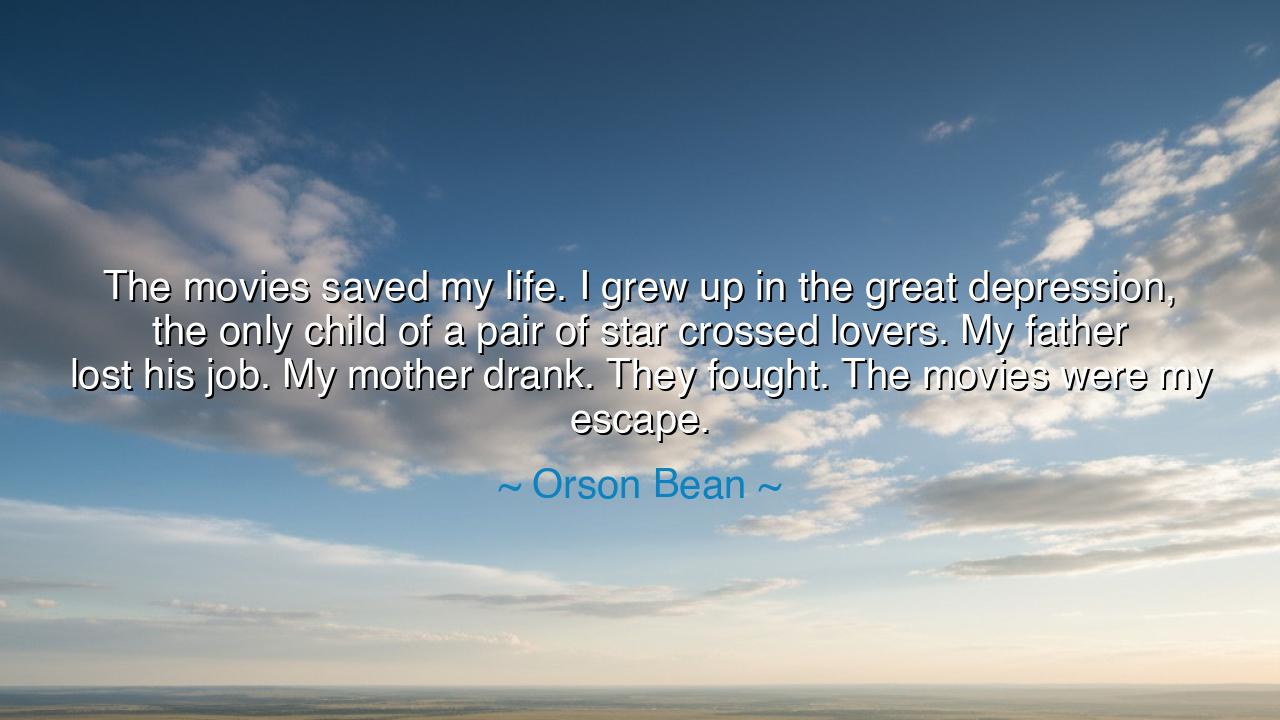
The movies saved my life. I grew up in the great depression, the
The movies saved my life. I grew up in the great depression, the only child of a pair of star crossed lovers. My father lost his job. My mother drank. They fought. The movies were my escape.






When Orson Bean declared, “The movies saved my life. I grew up in the Great Depression, the only child of a pair of star-crossed lovers. My father lost his job. My mother drank. They fought. The movies were my escape,” he was bearing witness to the redemptive power of art in the midst of despair. His words are not the mere nostalgia of an old man recalling his youth, but the testimony of a soul who found in the flickering screen a sanctuary from chaos, a window into worlds beyond his own suffering.
The essence of the quote lies in the contrast between two realities: the harshness of life at home and the wonder of life in film. In the depths of the Great Depression, when hunger and despair haunted households, Bean’s home was torn apart by conflict and addiction. The domestic sphere, which should have been a place of safety, became a battlefield of sorrow. Yet beyond the quarrels, beyond the empty pockets and bottles, lay the silver screen, glowing in the darkened theaters like a doorway to hope.
This experience was not his alone. Across America in the 1930s, millions flocked to theaters to escape the despair of unemployment and the uncertainty of the times. Films like Snow White and the Seven Dwarfs or Gone with the Wind lifted audiences into realms of fantasy and romance. Even if only for two hours, the weary found rest, the poor found wealth of imagination, and the broken found solace in the stories of others. It was in this collective ritual of cinema that children like Orson Bean discovered that despair was not the only story that could be told.
History offers countless parallels. In war-torn Europe during World War II, cinema continued to flourish, not because people wished to ignore their suffering, but because they needed to endure it. In the bombed streets of London, citizens gathered in theaters even during air raids, as if to defy destruction with laughter and song. Just as the psalms of David gave comfort to the Israelites in exile, so too did the movies give comfort to those living through depression and war. In these acts, we see how storytelling—whether sung, spoken, or projected on a screen—becomes a lifeline for the human spirit.
Bean’s testimony also reveals the role of imagination as survival. He might have been crushed by the weight of his family’s despair, but the movies taught him to dream, to believe in possibilities beyond his circumstances. They did not erase his pain, but they gave him the strength to carry it. The screen became both mirror and map: a mirror that reflected the struggles of humanity, and a map that pointed to something greater than suffering.
The lesson, O seekers of wisdom, is that art is not luxury but necessity. Stories, songs, paintings, and films are not mere distractions; they are medicines for the soul. They do not erase the harshness of reality, but they give us the courage to endure it, and sometimes the imagination to change it. Just as Orson Bean was saved by the movies, so too may countless others be saved by the stories that kindle hope in their darkest hours.
Practical action lies here: do not dismiss the power of art—whether as creator or audience. If you are broken, seek solace in stories that remind you of light. If you are an artist, labor with care, for you may be creating not just entertainment, but lifelines for those you will never meet. Support the arts, for they are sanctuaries of the human spirit, especially for the lonely and the suffering.
Therefore, let Orson Bean’s words endure as a testament: though life may bring despair, there is always refuge in the stories that speak to the soul. Let us cherish them, create them, and pass them on, so that in every generation, the weary may find their escape and, perhaps, their salvation. For truly, the movies saved his life—and in saving his, they show us how they may save our own.






AAdministratorAdministrator
Welcome, honored guests. Please leave a comment, we will respond soon